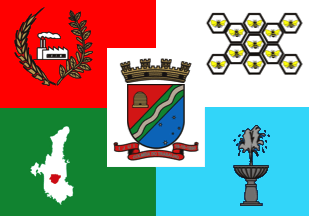 image by Ivan Sache, 19 July 2020
image by Ivan Sache, 19 July 2020 
Last modified: 2020-07-25 by ian macdonald
Keywords: rio grande do sul | ijuí |
Links: FOTW homepage |
search |
disclaimer and copyright |
write us |
mirrors
 image by Ivan Sache, 19 July 2020
image by Ivan Sache, 19 July 2020
The municipality of Ijuí (83,475 inhabitants in 2019; 68,912 ha) is located
400 km north-west of Porto Alegre. The municipality is formed of the districts
of Ijuí (seat), Alto da União (1,364 inh.; est. by Municipal Law No. 2,044
promulgated on 27 September 1984), Barreiro (776 inh.; est. by Municipal Law No.
2,160 promulgated on 30 October 1986), Chorão (1,297 inh.; est. by Municipal Law
No. 849 promulgated on 21 July 1964); Esquina Heidmann (est. by Municipal Law
No. 5,833 promulgated on 15 October 2013), Floresta (551 inh.; est. by Executive
Decree No. 19 promulgated on 2 February 1965 as the renaming of Linha 8 Leste,
est. by Municipal Law No.865 promulgated on 4 November 1964), Itaí (617 inh.;
est. by Municipal Law No. 2,194 promulgated on 16 jJune 1987), Linha 6 Norte
(est. by Municipal Law No. 5,524 promulgated on 14 October 2011), Mauá (812 inh.;
est. by Municipal Law No. 840 promulgated on 30 April 1964), Santana (1,234 inh.;
est. by Municipal Law No. 2,150 promulgated on 20 June 1986), and Santo Antônio
(369 inh.; est. by Municipal Law No. 1,979 promulgated on 2 March 1984).
Ijuí was established, as Ijuhy colony, on 19 October 1890. Ijuhy means in
Tupi-Guarani "River of Divine Water". The development of the colony was boosted
in 1899 with the arrival of farmers coming from older colonies in Rio Grande do
Sul. The municipality of Ijuí was established on 21 January 1912 and inaugrated
on 11 February 1912.
https://www.ijui.rs.gov.br
Municipal website
Ivan Sache, 19 July 2020
The flag of Ijuí is prescribed by Municipal Law No. 1,269 promulgated on 20
October 1971.
Article 1.
Flag divided into four rectangles. The upper
left triangle, green, charged with spikes of Tri[tic]um sativum [wheat]
forming a semi-circle and branches of Soja hispida [soybean] all or, in
the center, a factory. The upper right rectangle on a mosaic of hexagons, a
honeycomb with seven Apis mellifica [bees]. The lower left rectangle,
green with a white map of the municipality. The lower right corner, blue charged
with a white fountain. In the center, a white rectangle with the upper side
curved and convex, charged with the coat of arms of the municipality prescribed
by Law No. 583 promulgated on 13 November 1959.
https://leismunicipais.com.br/a/rs/i/ijui/lei-ordinaria/1971/126/1259/lei-ordinaria-n-1259-1971-adota-a-bandeira-do-municipio
Leis Municipais database
The description of the flag was corrected by
Municipal Law No. 4,013 promulgated on 8 October 2002. The only change was in
the description of the upper right rectangle.
Article 1.
[...]
The
upper right rectangle, charged with a honeycomb, represented by nine hexagonal
mosaics each containing in the center an Apis mellifica [bee].
[...]
https://leismunicipais.com.br/a/rs/i/ijui/lei-ordinaria/2002/401/4013/lei-ordinaria-n-4013-2002-altera-as-caracteristicas-da-bandeira-do-municipio-constantes-no-art-1-da-lei-n-1259-de-20-de-outubro-de-1971-revoga-leis-que-menciona-e-da-outras-providencias
Leis Municipais database
The coat of arms of Ijuí is prescribed by
Municipal Law No. 583 promulgated on 13 November 1959.
Article 1.
A
Portuguese shield divided in bend sinister by river Ijuí, on a field vert
(green). In chief, on a field gules (red) a honeycomb or; in base, on a field
azure (blue) the Southern Cross with stars argent. Beneath the shield a scroll
gules inscribed with the writing "Ijuí Colmeia do Trabalho 19-10-1890" [Work
Bee-Hive] in letters argent. The shield surmounted by a four-towered mural crown
or.
https://leismunicipais.com.br/a/rs/i/ijui/lei-ordinaria/1959/58/583/lei-ordinaria-n-583-1959-adota-escudo-do-municipio
Leis Municipais database
Photos
https://static.ijui.rs.gov.br/imagens/desfile_civico_e_militar_2018_f1l4l.JPG
https://static.ijui.rs.gov.br/imagens/desfile_civico_e_militar_2018_e8o2s.JPG
Ivan Sache, 19 July 2020